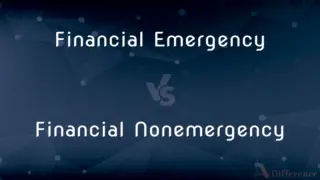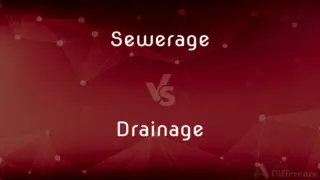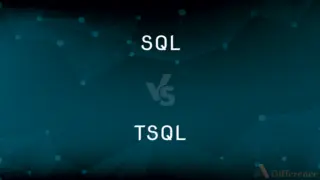Security vs. Privacy — What's the Difference?
By Tayyaba Rehman & Fiza Rafique — Updated on May 10, 2024
Security involves protecting data from unauthorized access and threats, focusing on safeguarding information; privacy concerns the use and governance of personal data, emphasizing the right to confidentiality and control over information.

Difference Between Security and Privacy
Table of Contents
ADVERTISEMENT
Key Differences
Security measures are designed to protect data, systems, and networks from breaches and attacks, aiming to ensure the integrity, availability, and confidentiality of information. Privacy, on the other hand, focuses on how personal information is collected, used, and shared, advocating for the individual’s right to control their own data.
While security encompasses a broad range of practices like encryption, firewalls, and antivirus software to prevent unauthorized access, privacy laws and policies determine the limits of data usage and the rights of individuals to access and control their own information. Whereas security is about protecting data from external threats, privacy is about protecting individuals from potential overreach by collectors and users of data.
Security professionals work to identify vulnerabilities and threats to information systems and mitigate risks through various defensive strategies. Conversely, privacy professionals focus on compliance with privacy laws and regulations, ensuring that personal data is handled in accordance with legal and ethical standards.
Security is a critical component of IT infrastructure in both corporate and personal environments, ensuring that data remains safe from cyberattacks and data breaches. Privacy concerns are more about ethical and legal implications, considering how data collection affects personal rights and freedoms.
The goals of security and privacy can sometimes overlap, such as in the case of data breaches where security measures fail, leading to privacy violations. However, robust security measures are essential for maintaining privacy, as they prevent unauthorized access to personal information.
ADVERTISEMENT
Comparison Chart
Focus
Protecting data from unauthorized access
Ensuring individuals' control over their data
Key Practices
Encryption, firewalls, antivirus
Data minimization, consent management
Professional Role
Security analyst, cybersecurity expert
Privacy officer, compliance manager
Regulatory Concern
Cybersecurity laws, industry standards
Data protection laws, such as GDPR
Concerns
Integrity, confidentiality, availability
Right to be forgotten, data access rights
Compare with Definitions
Security
Measures taken to guard against espionage or sabotage, crime, attack, or escape.
They updated their security protocols to prevent data breaches.
Privacy
A state in which one is not observed or disturbed by other people.
The privacy settings on social media platforms allow users to control who sees their posts.
Security
Any organization or department responsible for protection or safety.
The security team monitored the network for any suspicious activity.
Privacy
The quality or state of being apart from company or observation.
She valued her privacy and rarely shared personal information online.
Security
Measures taken to ensure that information is not disclosed to unauthorized individuals.
Security measures such as encryption help protect sensitive data.
Privacy
The state of being free from public attention.
Celebrities often struggle to maintain their privacy.
Security
Procedures or measures designed to protect the safety of a state, organization, or institution.
Enhanced security measures were implemented after the cyberattack.
Privacy
The right of someone to keep their personal matters and relationships secret.
Privacy laws protect individuals from having their personal data shared without consent.
Security
The state of being free from danger or threat.
The new antivirus software improved our computer's security.
Privacy
Freedom from unauthorized intrusion.
Installing privacy software can help shield your browsing habits from third parties.
Security
Security is freedom from, or resilience against, potential harm (or other unwanted coercive change) caused by others. Beneficiaries (technically referents) of security may be of persons and social groups, objects and institutions, ecosystems or any other entity or phenomenon vulnerable to unwanted change.
Privacy
Privacy is the ability of an individual or group to seclude themselves or information about themselves, and thereby express themselves selectively. When something is private to a person, it usually means that something is inherently special or sensitive to them.
Security
Freedom from risk or danger; safety.
Privacy
A state in which one is not observed or disturbed by other people
She returned to the privacy of her own home
Security
Freedom from doubt, anxiety, or fear; confidence.
Privacy
The quality or condition of being secluded from the presence or view of others
I need some privacy to change into my bathing suit.
Security
A group or department of private guards
Call building security if a visitor acts suspicious.
Privacy
The state of being free from public attention or unsanctioned intrusion
A person's right to privacy.
Security
Measures adopted by a government to prevent espionage, sabotage, or attack.
Privacy
(uncountable) The state of being secluded from the presence, sight, or knowledge of others.
I need my privacy, so please stay out of my room.
Security
Measures adopted, as by a business or homeowner, to prevent a crime such as burglary or assault
Security was lax at the firm's smaller plant.
Privacy
(uncountable) Freedom from unwanted or undue disturbance of one's private life.
It takes a village to rob one of a sense of privacy.
Security
Measures adopted to prevent escape
Security in the prison is very tight.
Privacy
(uncountable) Freedom from damaging publicity, public scrutiny, surveillance, and disclosure of personal information, usually by a government or a private organization.
Privacy is assumed by many to be among common-law rights.
Security
Something deposited or given as assurance of the fulfillment of an obligation; collateral.
Privacy
A place of seclusion.
Security
One who undertakes to fulfill the obligation of another; a surety.
Privacy
A relationship between parties seen as being a result of their mutual interest or participation in a given transaction, contract etc.
Security
A financial instrument, such as a stock or bond, representing rights of ownership or creditorship and often traded in secondary markets.
Privacy
(obsolete) Secrecy.
Security
(countable) Something that secures.
Privacy
A private matter.
Security
An organization or department responsible for providing security by enforcing laws, rules, and regulations as well as maintaining order.
Pamela works in security.
Privacy
The state of being in retirement from the company or observation of others; seclusion.
Security
(legal) Something that secures the fulfillment of an obligation or law.
Privacy
A place of seclusion from company or observation; retreat; solitude; retirement.
Her sacred privacies all open lie.
Security
(legal) Freedom from apprehension.
Privacy
Concealment of what is said or done.
Security
A tradeable financial asset, such as a share of stock.W
Privacy
A private matter; a secret.
Security
(finance) Proof of ownership of stocks, bonds or other investment instruments.
Privacy
See Privity, 2.
Security
(finance) Property etc. temporarily relinquished to guarantee repayment of a loan.
Privacy
The quality of being secluded from the presence or view of others
Security
A guarantee.
Privacy
The condition of being concealed or hidden
Security
(obsolete) Carelessness; negligence.
Security
The condition or quality of being secure; secureness.
His trembling hand had lost the ease,Which marks security to please.
Security
Hence, carelessness; negligence; heedlessness.
He means, my lord, that we are too remiss,Whilst Bolingbroke, through our security,Grows strong and great in substance and in power.
Security
That which secures or makes safe; protection; guard; defense.
Those who lent him money lent it on no security but his bare word.
Security
Freedom from risk; safety.
Give up yourself merely to chance and hazard,From firm security.
Some . . . alleged that we should have no security for our trade.
Security
One who becomes surety for another, or engages himself for the performance of another's obligation.
Security
An evidence of debt or of property, as a bond, a certificate of stock, etc.; as, government securities.
Security
The state of being free from danger or injury;
We support the armed services in the name of national security
Security
A formal declaration that documents a fact of relevance to finance and investment; the holder has a right to receive interest or dividends;
He held several valuable securities
Security
A department responsible for the security of the institution's property and workers;
The head of security was a former policeman
Security
Measures taken as a precaution against theft or espionage or sabotage etc.;
Military security has been stepped up since the recent uprising
Security
Defense against financial failure; financial independence;
His pension gave him security in his old age
Insurance provided protection against loss of wages due to illness
Security
Freedom from anxiety or fear;
The watch dog gave her a feeling of security
Security
An electrical device that sets off an alarm when someone tries to break in
Security
Property that your creditor can claim in case you default on your obligation;
Bankers are reluctant to lend without good security
Security
A guarantee that an obligation will be met
Common Curiosities
How do security and privacy interact?
Security measures are implemented to protect data, which in turn supports privacy by preventing unauthorized access to personal information.
What are some common security practices?
Common security practices include the use of firewalls, encryption, and antivirus software to protect data and systems.
What is privacy concerned with?
Privacy is concerned with the rights of individuals to control their personal information and to be free from unauthorized intrusion into their personal affairs.
What are privacy laws?
Privacy laws are regulations that govern the collection, storage, and dissemination of personal information by organizations.
Can you have privacy without security?
Without security, there is no privacy. Effective security practices are necessary to protect personal information and ensure privacy.
What is the main goal of security?
The main goal of security is to protect information and systems from unauthorized access, ensuring their integrity, availability, and confidentiality.
How do organizations ensure privacy?
Organizations ensure privacy through policies and practices that respect individual rights and comply with relevant privacy legislation.
What role does encryption play in privacy?
Encryption plays a crucial role in privacy by encoding personal information, making it inaccessible to unauthorized users.
How can individuals protect their privacy online?
Individuals can protect their privacy online by using strong passwords, enabling privacy settings, and being cautious about the information they share online.
Why is data security important for privacy?
Data security is essential for privacy because it helps protect personal information from unauthorized access and breaches.
What is the difference between privacy and confidentiality?
Privacy refers to an individual's rights to control their personal information, while confidentiality refers to the obligation of an entity to protect information from unauthorized access.
How do security breaches affect privacy?
Security breaches can lead to significant privacy violations by exposing personal information to unauthorized parties, often resulting in identity theft and other harms.
What does a privacy officer do?
A privacy officer ensures that an organization complies with privacy laws and manages issues related to data protection and privacy.
What challenges do privacy laws face with technology advances?
Privacy laws often struggle to keep pace with rapid technological advances, making it challenging to protect personal information effectively.
What is a data protection impact assessment?
A data protection impact assessment (DPIA) is a process to help identify and minimize the data protection risks of a project.
Share Your Discovery

Previous Comparison
Distinct vs. Distinctive
Next Comparison
Persecution vs. ProsecutionAuthor Spotlight
Written by
Tayyaba RehmanTayyaba Rehman is a distinguished writer, currently serving as a primary contributor to askdifference.com. As a researcher in semantics and etymology, Tayyaba's passion for the complexity of languages and their distinctions has found a perfect home on the platform. Tayyaba delves into the intricacies of language, distinguishing between commonly confused words and phrases, thereby providing clarity for readers worldwide.
Co-written by
Fiza RafiqueFiza Rafique is a skilled content writer at AskDifference.com, where she meticulously refines and enhances written pieces. Drawing from her vast editorial expertise, Fiza ensures clarity, accuracy, and precision in every article. Passionate about language, she continually seeks to elevate the quality of content for readers worldwide.















































